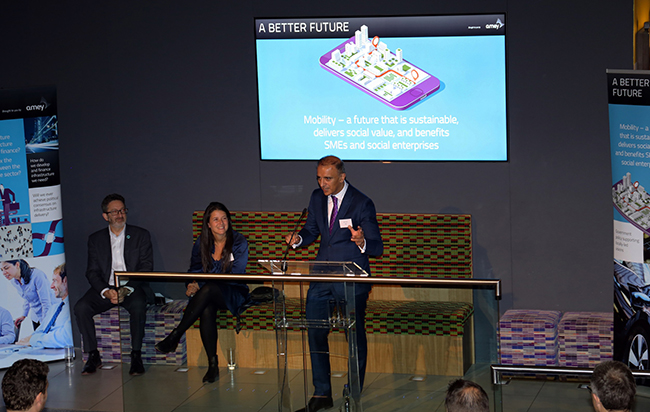
No conversation going into the next 10 years can really be had without talking about sustainability, says Asif Ghafoor, managing director of Amey Investments.
Speaking at the launch of infrastructure support specialist Amey's latest white paper at the London Transport Museum, Ghafoor insisted that “it needs to be part of your core DNA in your business decisions and investment decisions”.
He explains that the paper addresses issues such as having the right people to deliver infrastructure while also developing knowledge and working with partners from other countries.
“As we moved forward, all of this service we are delivering in mobility will produce data,” he continued. “We can improve the quality of the service, our investment decision and our own overall mobility service if we use data to help make the decisions.”

Jessica Oppetit, UK general manager at ViaVan, referred to an area of the report which looks at the possibility of driving revenue and “social good” at the same time.
She explained that ViaVan carried out a deployment in Berlin where the city government was trying to drive “social good with some sort of experimental licence”. This led to a partnership with German public transit operator BVG. “They said that in order to get this licence, everything had to be wheelchair accessible,” she continued. “We provided a service where these passengers can call a ride and get picked up [within] 10 minutes of the request…our passengers said they have never had this freedom of movement before.”
Nearly half of the fleet involved in the trial were electric vehicles, a proportion which Oppetit revealed will expand to ViaVan's entire fleet in Germany from next year.
In the paper's conclusion, Amey said public policy on mobility needs to be driven and supported by central government - but with local and city authorities having the flexibility to shape their mobility strategies. Meanwhile, revenue models need to benefit private sector investors in mobility and the private sector.
The paper says that city and local authorities can provide an improved transport service through data-rich insight around traveller preferences, but warned that providing data for free reduces the need for data providers to provide quality data. Any data collected from a data hub should be available on a commercial basis only, Amey added.
According to Amey, measuring mobility will allow the public to understand how it is benefiting society and incentivise them to adopt new ways of travelling.
Encouraging the best talent to join the private sector in a post-Brexit world and developing the right skills is crucial to realising a UK that is “truly mobility-focused“, the paper added.
Future perspective
Looking ahead, Amey said engaging with local people to ask and answer questions around what form of mobility they want, will be increasingly important. A data hub could provide information that transport authorities need to address challenges around reducing journey times and better understanding traveller preferences.
New mobility services must fully integrate with existing public transport options to encourage as many people as possible away from cars. It must also be socially inclusive, as Ofcom's

Amey emphasised that private sector firms must help local authorities and cities realise ambitions which may include investing to promote longer term strategies to tackle air quality, deal with congested or dangerous roads or meet carbon emission challenges.
The company’s





